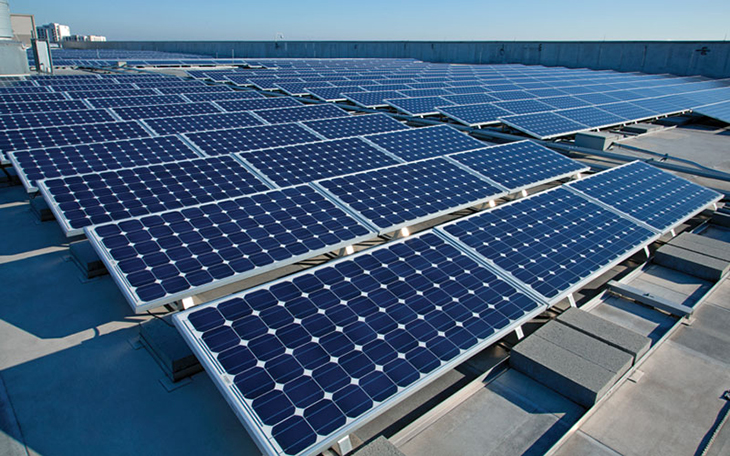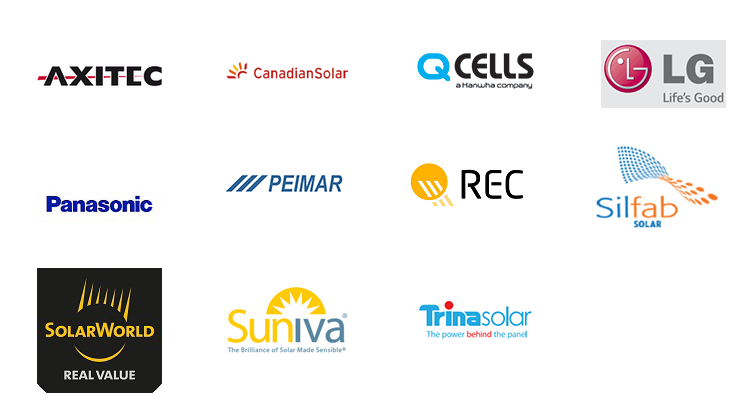 Loading... Please wait...
Loading... Please wait...Products
- Solar Panels
- Solar Panel Kits
- Solar Generators
- Inverters
- Inverter Monitoring
- Inverter Accessories
- Balance of Systems
- Racking and Mounting
- Rails
- Flashings
- Splice Kits
- Stopper Sleeves
- Conduit Mounts
- Attachments
- Brace Assembly
- Base Mount
- Brackets
- Bolts
- Clamps
- Caps
- L-Feet
- Washers
- Skirt
- Lugs
- Tilt Legs
- Hooks
- Stand-Offs
- Ballast Bay
- Top of Pole Mount
- Side of Pole Mount
- Flush Mount Kits
- Ground Mount Kits
- Roof Mount Kits
- Hardware Packages
- Wire Management
- Batteries
- Battery Accessories
- Charge Controllers
- Tools and Supplies
- View All Products
Solaris Blog - Solar Panel Manufacturers
How To Pick The Best Solar Panel Manufacturer
Posted by Brandi Casey on 30th Mar 2017

Selecting the right solar panel for your systems needs is essential in having a successful solar installation. With the number of solar panel manufacturers currently in the market, and coming into the market, it can be difficult to determine which company will offer you the most stability, power and quality.
Manufacturer History
Although many new manufacturers offer cutting edge technologies, it is important to make sure that they will be around past the panels warranty, which is typically 25 years though they are known to ask longer. As with any growing industry, new companies seem to spring up overnight, some become highly successful while other disappear. A company that goes out of business not only hurts your investment, but can make it difficult to find replacement/extension panels for the system. If the company that manufactured the panels goes out of businesses your warranties are void.
Rated Wattage
In terms of solar trends, high efficiency/watt modules are proving to be the way of the future. A higher watt module also mean that they will generate more power. The higher watt the modules the fewer you will need to install. There are a handful of solar companies that produce modules under 250 watts, however these panels are typically installed for outdoor equipment such as traffic signals; however, these modules may not be the best fit for your rooftop installation. Roof space is typically limited, and the fewer panels you put onto your roof, the less expensive and easier the installation process will be. Higher watt modules typically have a higher efficiency which enhances the energy output of the solar system.
Efficiency Levels Above 16.5%
Efficiency is extremely important in any technological device, and solar panels are no difference. In order to get the most out of your system, you must ensure that the array contributes as much as possible for the system. The efficiency of the solar panels is calculated by the maximum power output divided by the incident radiation flus multiplied the area of the collector. Luckily, manufacturers create specifications sheets which show tested efficiency ratings, so advanced calculus isn’t needed to determine the modules efficiency.
Customer Service
Hopefully, you will not have to ever contact the manufacturer for a warranty claim, however, it is possible that you will need to contact them at some point in your solar panels lifetime. Whether this reason is for a warranty claim, general question or assistance in the installation process you will want to reach a knowledgeable and helpful individual in the company. Manufacturers without a contact line, form, or email address should be avoided. Although you may not want to immediately contact the manufacturer, thinking about future interactions is important and a visit to the manufacture’s website.
Price
In terms of price, the cost of the panel is dependent on production costs of the manufacturer. It may not necessarily be a good indicator of the quality of the product. However, the cost of the panels should be considered in terms of your budget. If you select a module outside of your budget and determine that you could purchase the a few of the modules you need an add onto it at a later date, keep in mind that solar technology is rapidly growing and that module may not be available when you can afford the rest of the system. Manufacturer lines are consistently updating, and what is available one quarter is may not be available in the next.
Keeping these insights in mind can save a lot of time, money
and frustration in the future for your solar project. Although it can be time
consuming, research on solar panel manufacturers can offer peace of mind when
done correctly. If you have any questions regarding a particular manufacturer,
background and history of the manufacturer can be found at the manufacturer’s page.
Manufacturers We Recommend




